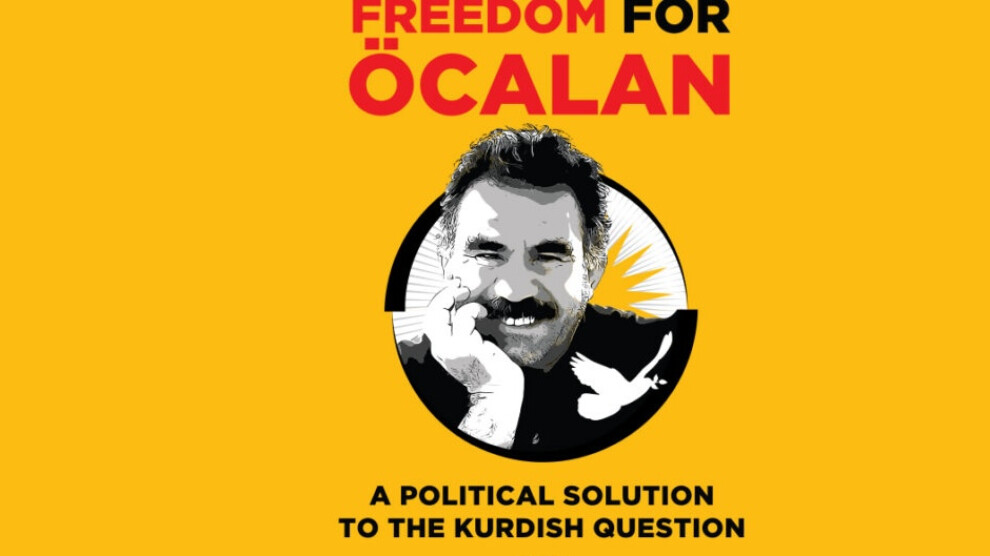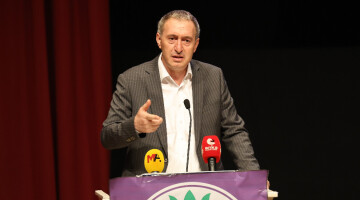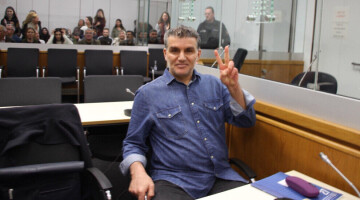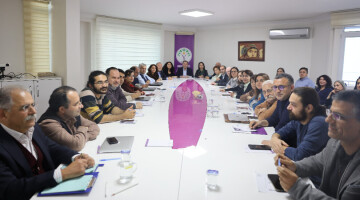Kurdish People's Leader Abdullah Öcalan, who is kept under absolute isolation in İmralı F Type High Security Closed Prison, has not been heard from since his interrupted phone call with his brother Mehmet Öcalan on 25 March 2021. Öcalan was last banned from seeing his lawyers for 6 months on 31 October 2023.
It came out that Abdullah Öcalan and his fellow prisoners in İmralı, Ömer Hayri Konar, Veysi Aktaş and Hamili Yıldırım, were given a new 6-month ban on lawyer visits. The lawyers learned about the ban after they filed an application to judicial authorities with a request for a meeting with their clients in İmralı.
The ‘Freedom for Öcalan: A Political Solution to the Kurdish Question’ Campaign released a statement calling on the European Committee for the Prevention of Torture or Degrading Treatment (CPT), a body of the Council of Europe (CoE), to fulfil its duty to uphold human rights and fundamental freedoms.
The statement noted that Kurdish leader Abdullah Ocalan is a citizen of a Council of Europe member state who has been deprived of his human rights in a Turkish prison for 25 years, including, for the last three years, the right to see his lawyers and speak to his family.
On 3 May, Öcalan’s lawyers received a further ban on access to their client, who is held on the Turkish maximum security prison island of İmralı, and for 38 months has been under conditions of absolute solitary confinement in violation of international humanitarian law. The repeated bans imposed by the Turkish prison administration are considered arbitrary and appeals are routinely rejected.
Öcalan has not been heard from since a brief telephone conversation with his brother on 25 March 2002. Despite ongoing concerns for his well-being, Öcalan and three other prisoners, Ömer Hayri Konar, Veysi Aktaş and Hamili Yıldırım, have been given a further six-month ban on lawyer visits.
Lawyers from Asrin Law Office submitted a request to the Bursa 2nd Execution Judge to facilitate meetings with their clients. They state, "On May 3, we were informed of a new six-month ban on lawyer visits for our clients.". No reason was given for the decision.
Appeals have been rejected and the lawyers plan to take their case to Turkey's Constitutional Court. This latest ban is the 13th time in the past eight years that Öcalan has been denied access to his lawyers. Since February 2018, these bans have been renewed every six months. Similar restrictions also prevent family visits.
The Campaign for Öcalan's Freedom was launched in October 2023 in a global attempt to highlight the oppression faced by all four Kurdish regions, which are divided by the borders of Turkey, Syria, Iraq and Iran. The campaign aims to secure the rights of Öcalan, the leader of the Kurdish People, to meet with his lawyers and family, and to secure his release so that he can contribute to the search for a just and democratic political solution to the long-standing Turkish-Kurdish conflict, which has important implications for regional security.
The CPT is losing credibility
Pressure has been mounting on the Council of Europe's Committee for the Prevention of Torture to take concrete steps to end the inhumane isolation practices in Turkish prisons, particularly with regard to the treatment of Öcalan, who is considered by millions of Kurds to be their legitimate political leader and the key to restarting peace talks between the Turkish state and Kurdish forces.
The CPT has carried out inspections at İmralı but has failed to publish a report on the prison conditions and welfare of Öcalan or the three other inmates on the island. The secrecy surrounding conditions in İmralı Prison contrasts sharply with the norms of transparency in other prisons. Although the CPT rules do not allow publication of a report without the permission of the state concerned (in this case Turkey), they do have the possibility of making a statement when their advice has not been taken.
Remarking that the CPT is widely accused of losing credibility because of this inaction, which appears to condone human rights violations in member states, the statement by the international campaign 'Freedom for Öcalan: A Political Solution to the Kurdish Question’ said:
- We condemn the unjust and illegal restrictions on Öcalan's access to his lawyers and his right to communicate. The prolonged isolation and denial of basic human rights to Mr Öcalan is unacceptable and violates international humanitarian law.
- We call again on the European Committee for the Prevention of Torture or Degrading Treatment (CPT), a body of the Council of Europe (CoE), to fulfil its duty to uphold human rights and fundamental freedoms by sending a delegation to İmralı Island to meet with Öcalan and assess his health.
- We urge Turkey to allow his family and lawyers to visit him, as stipulated by the obligations of the Council of Europe (CoE) and the CPT.
- The arbitrary bans on visits by lawyers and communication with family members must be lifted to ensure that Öcalan's rights are respected.
- The CPT’s silence in the face of this isolation effectively makes them an accomplice in Turkey's policy of isolation, torture, and mistreatment of Öcalan, A better alternative is to pressure Turkey to return to the negotiating table with the leader of the Kurdish people, Abdullah Öcalan, who mediated a dialogue process in 2013-2015, which was unilaterally ended by Erdogan. This process was welcomed internationally, and its revival would stabilise Turkey by resolving the Kurdish question.












